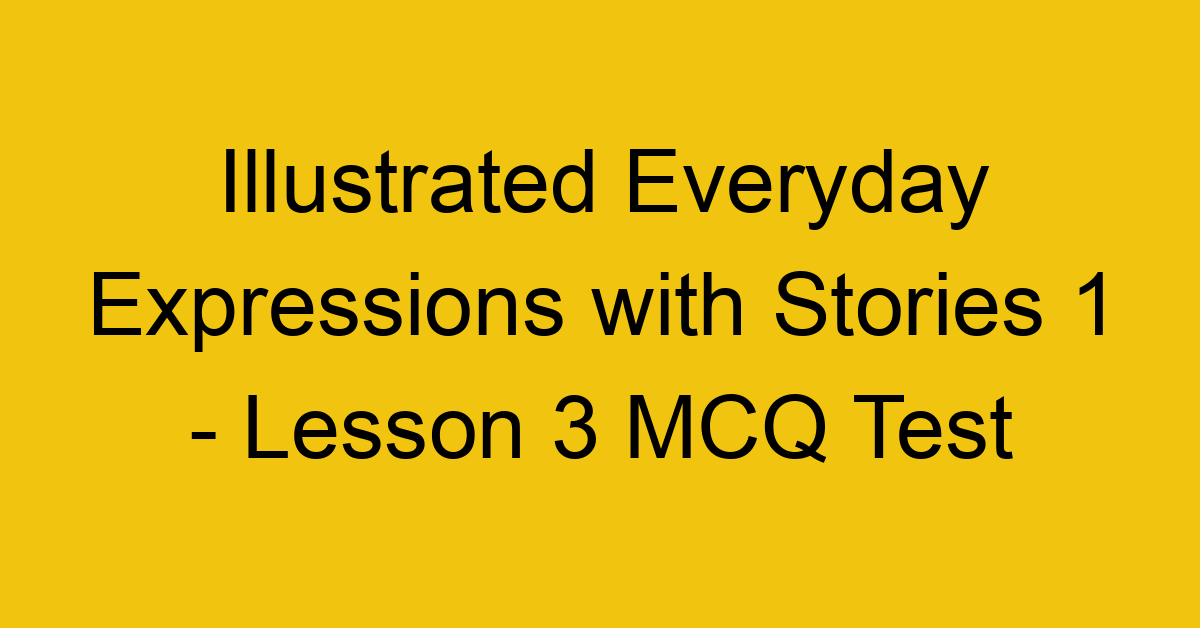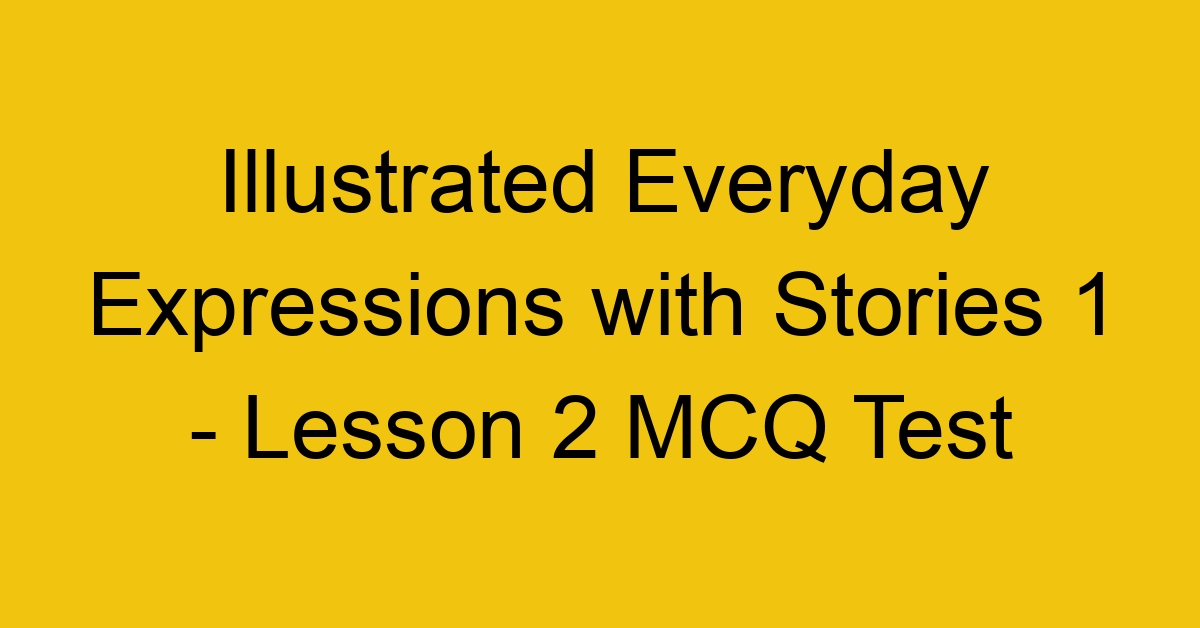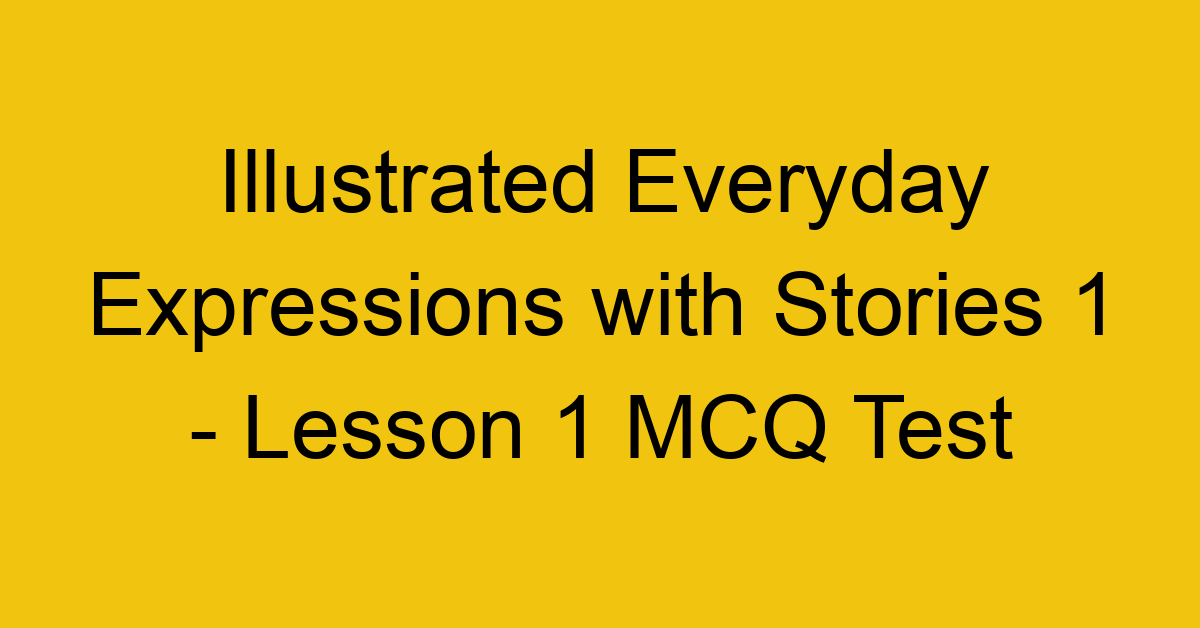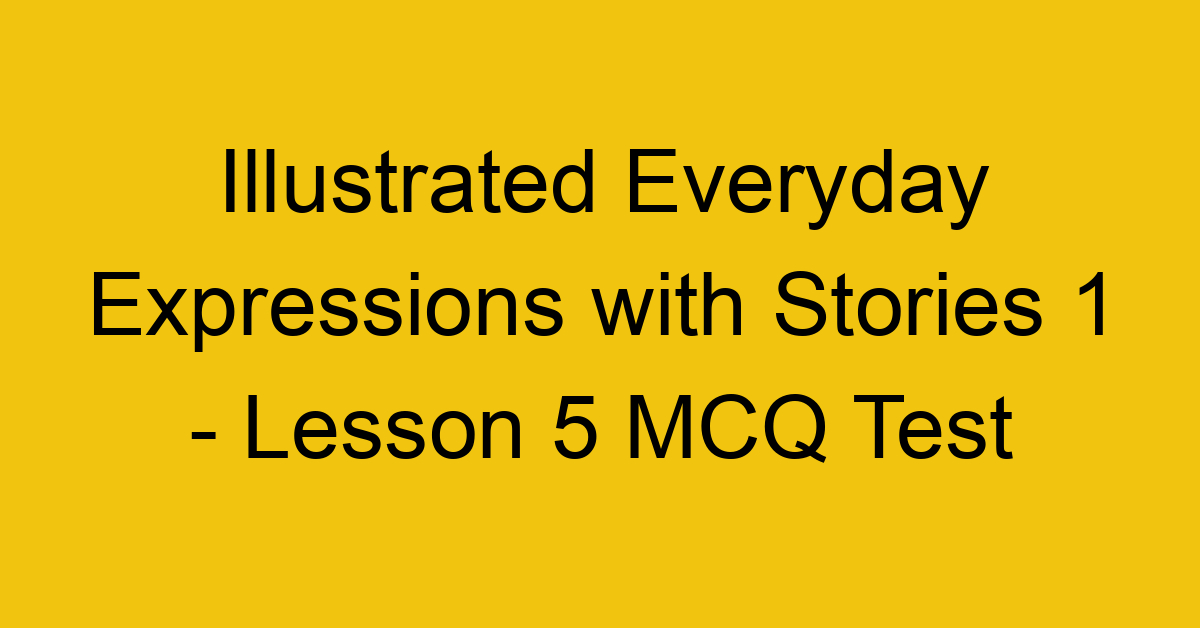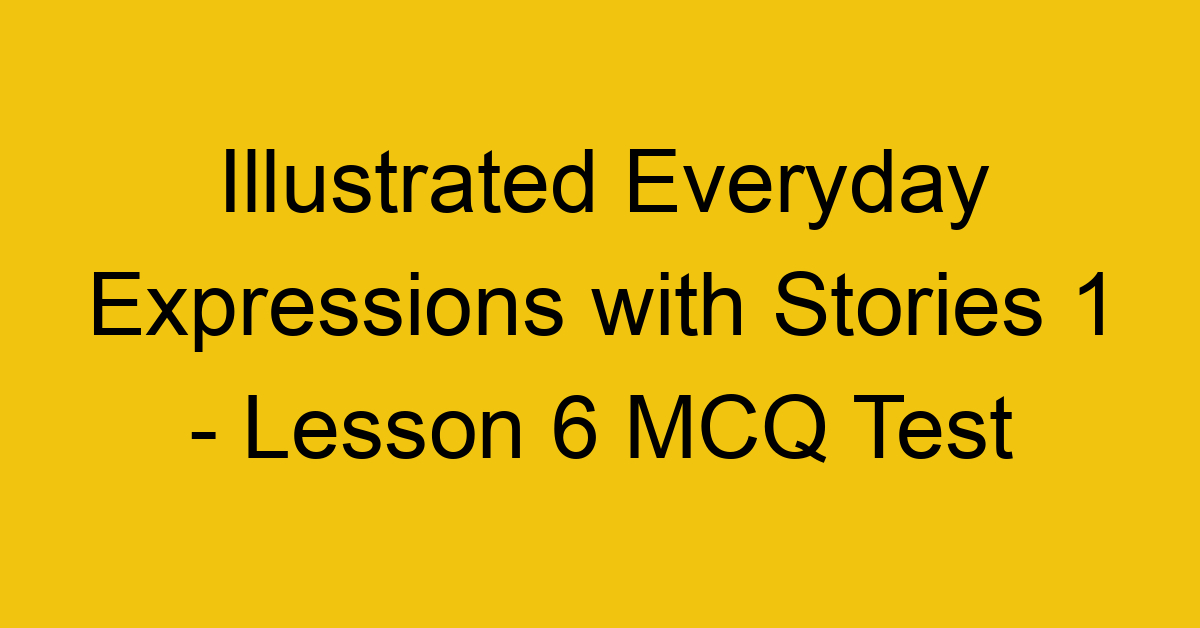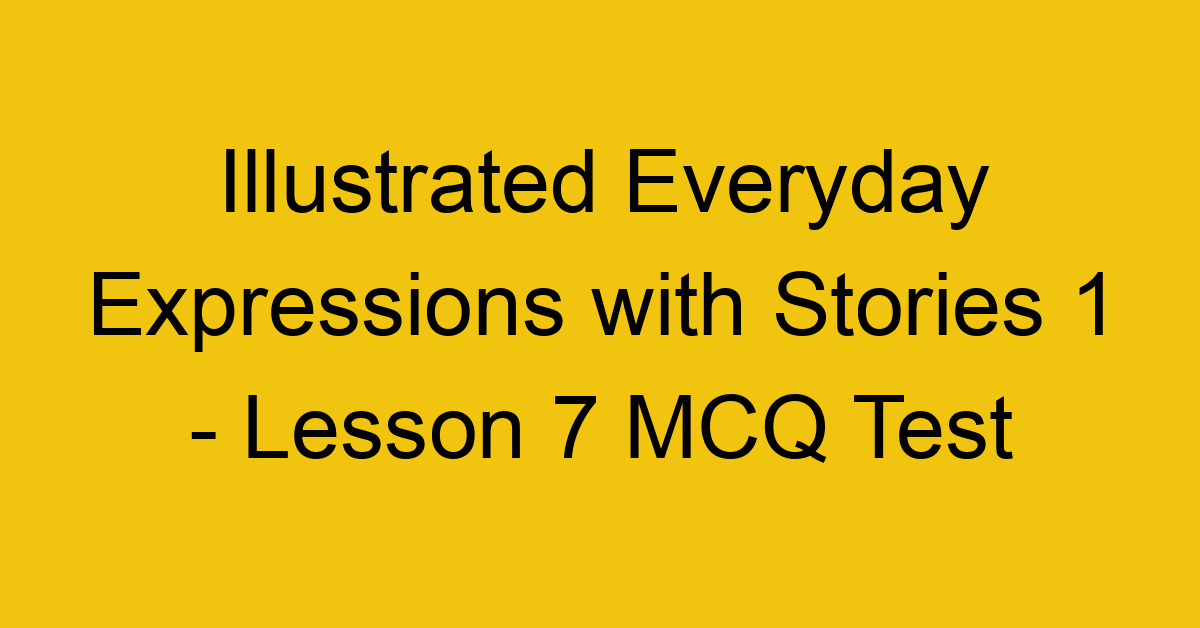Illustrated Everyday Expressions with Stories 1 - Lesson 4 MCQ Test
Lesson 4 – The Jindo Dog
Idioms
be thankful for = appreciate; be grateful for
The baby kangaroo is thankful for his mother’s love and care.
The beggar was thankful for the coin.
The criminal was thankful for the judge’s mercy.
A: Some people sleep in the subway station because they don’t have a house or a bed.
B: That would be terrible. I am very thankful for my home.
be used to = be familiar with; be accustomed to
It doesn’t hurt anymore. I guess I’m used to it.
She is used to getting up early in the morning.
Tarzan was used to living in the jungle.
A: You’ve lived in Mexico for six months. How do you like it?
B: I like it, but my stomach isn’t used to Mexican food yet!
be willing to = be happy to; to inclined to; be prepared to
The soldier was willing to defend his country.
Sam was willing to lend money to his friend.
Miss Eyre was willing to teach in the small school.
A: Are you willing to help me with my chemistry homework?
B: Yes I am, but I am busy right now. I will help you tonight.
be worried about = be anxious about; be concerned about
I am worried about the baby!
The farmer was worried about the weather.
He is worried about his health.
A: I am worried about our dog.
B: Me too. He hasn’t eaten for three days.
be worth (~ing) = be useful enough to; equal in value to
Diamonds are expensive, but some people think they are worth buying.
The hotel is great! It‘s worth staying an extra night.
Our car is old, but it‘s worth keeping.
A: Is this movie worth watching?
B: No it’s not! I saw it last night, and it was terrible.
because of = due to; as a result of; owing to; on account of
She is happy because of her new sweater.
He can’t ride the bicycle because it has a flat tire.
We couldn’t go because of the weather.
A: Did you play baseball yesterday?
B: No I didn’t. We couldn’t play because of the rain.
before long = in a short time; pretty soon
Before long, you’ll be a big rabbit like me!
Dinner will be ready before long.
Before long, Sandy will graduate from high school.
A: The weather is getting colder.
B: Yes it is, and before long I think it will start to snow.
belong to = be owned by; be the property of
The teddy bear belongs to my little brother.
The yacht belonged to Mrs. Vanderbilt.
This business belongs to me.
A: Does this bag belong to Max?
B: No it doesn’t. It is Kathy’s bag.
between you and me = just between us; confidentially; off the record
Between you and me, I think there’s something wrong with that guy.
Between you and me, I think Greg is handsome.
Between you and me, I think the food here is terrible!
A: Please don’t tell anybody the story I just told you.
B: I won’t tell anybody else. I’ll keep it between you and me.
blow out = put out a fire; extinguish
Make a wish when you blow out the candle.
The wind blew out the fire.
He blew out the candle before going to bed.
A: Oh no! Why is it so dark in here?
B: The wind blew out our candles.
break away from = escape from; get away from; break free from
He wanted to break away from the group.
He broke away from the crowd.
The dog broke away from its owner.
A: How did Sylvia win the race?
B: She was with the other runners, then she broke away from them and crossed the finish line first!
break out = occur with suddenness or force; happen
Suddenly, an argument broke out.
He was just a child when war broke out in his country.
A fight broke out at the baseball game.
A: Why were you late for work today?
B: A fire broke out in my apartment this morning.
bring about = cause to happen; lead to; result in
Rain in July will bring about floods.
Years of stress brought about his illness.
Hard work brought about his success.
A: The weather is warmer this summer than it has been in the past. Why is that?
B: I don’t know. Some people think the warmer weather was brought about by air pollution.
bring in = get in; call in
My dog brings in the newspaper every morning.
Make sure that you don’t bring in dirt.
“Bring in the next patient,” said the doctor.
A: Oh no! It’s starting to rain on our picnic!
B: No problem! I will carry the hamburgers to the house, and you can bring in the cake.
bring out = reveal something to someone
He brought out a picture of his girlfriend.
The old woman brought out a gold ring.
Bring out the two men.
A: I’m going to get an orange from the refrigerator. Do you want anything?
B: Yes. Could you bring out some watermelon, please?
by oneself = alone; on one’s own
He likes to play by himself.
The girl went to the movie by herself.
After a few days of practice, the children could swim by themselves.
A: I want to go to the library by myself.
B: Why?
A: I have a lot of studying to do and don’t want to be disturbed.
by the way = incidentally; in addition
By the way, her father is a doctor.
By the way, may I borrow some money?
By the way, when are you going to America?
A: I heard that you’re moving to a new house.
B: Yes. By the way, do you need a sofa and some chairs?
by way of = be going through; via
You can get to Dundas by way of Lion Street.
We sailed to Europe by way of the Mediterranean Sea.
They came to North America by way of a land bridge.
A: Did the teacher say that I have to read that book?
B: No. She said by way of suggestion that you should read it.
call off = stop a planned event; cancel
He had to call off the birthday party because he felt sick.
The boss called off the meeting.
It rained so they called off the baseball game.
A: They had to call off the soccer game yesterday.
B: How come?
A: One of the teams didn’t have enough players.
call on = visit; come to see
He went to call on his friend.
She called on me but I wasn’t home.
Do you have time to call on your grandmother?
A: Where is Donald? I thought he was going to play soccer with us tonight.
B: He was going to, but some relatives called on him unexpectedly.
THE JINDO DOG
Dog are worth keeping as pets because they are willing to do anything for the family they belong to.They guard the house, bring in the paper, and play well with children. In Korea, Jindo dogs are known to be the smartest and most loyal dogs because of a famous story. According to this story, a Jindo dog saved a man’s life even though it brought about its own death.
A long time ago, a man went to call on his friend in another town. The man had to walk to the other town by way of a path through the woods. He didn’t like walking by himself, so the man took his dog with him.
When the man arrived at his friend’s house, he saw that there was a large drinking party going on. His friend welcomed him in and brought out some wine. It was very good, so he drank a lot. He was used to drinking wine, so he was not worried about having too much. Before long, however, the man got very drunk. (Between you and me, I think the man had a drinking problem.) At last, the man decided it was time to call off the drinking and go home. He broke away from the party and went home with his dog.
On the way, the man began to feel tired. He sat down to rest but quickly fell asleep because of all the wine he drank. The dog lay down by the man and waited for him to wake up. Then, all of a sudden, the dog smelled smoke. A fire broke out in the woods! A small wind was blowing, but it did not blow out the fire. The wind made the fire bigger!
The dog tried to wake up the man by barking, but the man was too drunk. He would not wake up. The dog heard the sound of a small river near the path. It tried to pull the man to the river, but the man was too big. It ran to the river and jumped in. Then the dog ran back to the man and shook itself. The man and the grass around him got a little wet. The dog ran back and forth many times. Finally, the man and the ground were all wet. The fire burned all around him, but it did not harm the man. Sadly, the dog was so tired from running that it fell down and died.
When the man woke up and found his dog had died, he cried. He knew that his dog had saved his life by giving up its own life. He was very thankful for his dog. The man told all of his friends how great Jindo dogs are. By the way, the man also gave up drinking after that.

